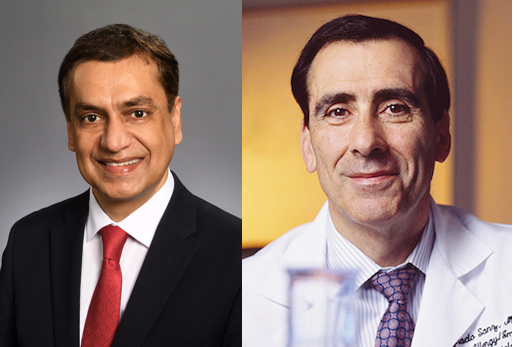The National Cancer Institute has awarded a five-year, $9.9 million grant to Emory investigators to study COVID-19 immune responses in patients with cancer or autoimmune diseases.
“This is a highly collaborative effort to study the unique challenges facing people with cancers and autoimmune disorders when dealing with COVID-19,” says Madhav Dhodapkar, MBBS, director of the Center for Cancer Immunology at Winship Cancer Institute of Emory University and co-leader of the Winship Cancer Immunology Research Program. “That’s because the underlying cancer or autoimmunity, as well as therapies used to treat these patients, may impact immunity to the coronavirus.”
Dhodapkar is co-principal investigator for the grant, along with Ignacio Sanz, MD, director of the Department of Medicine’s Lowance Center for Human Immunology, which studies autoimmune diseases such as systemic lupus erythematosus (SLE). The grant includes researchers at Winship Cancer Institute, Emory Vaccine Center and the Lowance Center.
Dhodapkar and Sanz are both Georgia Research Alliance Eminent Scholars. Dhodapkar is professor in the Department of Hematology and Medical Oncology and holds the Anise McDaniel Brock Chair; Sanz is head of the rheumatology division in the Department of Medicine.
The grant is part of the NCI’s SeroNet (Serological Sciences Network) initiative, the nation’s largest coordinated effort to study the immune response to COVID-19. Seven other medical centers are receiving similar Serological Sciences Centers of Excellence grants: Ohio State, University of North Carolina-Chapel Hill, Cedars-Sinai, Johns Hopkins, Tulane, Stanford and Icahn-Mount Sinai.
At Emory, the grant includes three projects, each covering different aspects of COVID-19 immunology:
- B cell responses to SARS-CoV-2 in autoimmune patients – led by Sanz and Eun-Hyung Lee, associate professor of medicine and director of Emory’s Asthma/Allergy Immunology program
- regulation of SARS-CoV-2 immunity in cancer patients – led by Dhodapkar and Rafi Ahmed, PhD, director of Emory Vaccine Center and co-leader of the Winship Cancer Immunology Research Program.
- diversity and longevity of COVID-19 immune responses – led by associate professor of pediatrics Jens Wrammert, PhD and Rafick-Pierre Sekaly, PhD, an accomplished immunologist who was recently recruited to Emory from Case Western.
Core facilities will be led by pathologists John Roback, MD, PhD and Andy Neish, MD and virologist Mehul Suthar, PhD. The researchers plan to use SARS-CoV-2 immunity assays developed and validated at Emory University Hospital by Wrammert and colleagues.
The cancer project will specifically focus on patients with hematological malignancies such as multiple myeloma and lymphoma, as well as non-small cell lung cancer, which is often treated with immunotherapies. The autoimmune project will focus on SLE, a specialty of Sanz, whose team recently identified similarities between immune response patterns in severe COVID-19 and acute SLE flares.

